At WiseGEEK, we're committed to delivering accurate, trustworthy information. Our expert-authored content is rigorously fact-checked and sourced from credible authorities. Discover how we uphold the highest standards in providing you with reliable knowledge.
What are Causes of Global Warming?
Global warming is a term generally used to describe the shift in the average temperature of the Earth’s surface since the mid-20th century. The causes of global warming are a matter of some debate, although there is largely a consensus among the scientific community, formalized in an Intergovernmental Panel on Climate Change report, that the majority of temperature increase since the mid-20th century came as a result of human activity. Before the mid-20th century, the primary causes of global warming were natural events, such as volcanic activity, and increased solar radiation.
One of the main causes of global warming is an increase in certain greenhouse gases, which absorb infrared radiation and trap warming energy in the atmosphere. Carbon dioxide is one of the major greenhouse gases, just behind water vapor in quantity, and levels of carbon dioxide in the atmosphere have increased by nearly 40% since the Industrial Revolution. Carbon dioxide is released by humans in a number of different contexts, for example, in the United States approximately 40% of carbon dioxide emissions come from generating electricity by means of burning fossil fuels, while cars are responsible for another 33% of emissions.

Although not as prevalent in the atmosphere, methane is another greenhouse gas responsible for global warming. Methane is approximately 20 times as effective in trapping heat as is carbon dioxide, and during the last century methane levels have risen by nearly 150%. A great deal of methane is released through the production of fossil fuels, and through the large-scale production of cattle. Methane is also produced in rice paddies, and as global demand for rice has increased, this single crop has become a significant contributor to methane production.

While some causes of global warming can be linked directly to a human activity, others come as cascading effects. As the mean temperature of the planet increases, certain systems breakdown and may increase the rate of global warming. For example, a great portion of the northern latitude of the planet is covered in permafrost, a sort of solid frozen soil. This permafrost has acted as a sink for many greenhouse gases, including carbon dioxide and methane, for tens of thousands of years, and as temperatures have increased, the permafrost that has been frozen for more than 30,000 years has begun to melt. In addition to causing the ground to shift in often-dangerous ways, this also causes the gases to be released into the atmosphere, further speeding the process of global warming.

Other cascading causes of global warming include the ice-albedo effect, and reduced sequestering by the oceans. As temperatures increase, ice on the planet melts, reducing the amount of highly-reflective land that in the past has minimized solar absorption, and increasing the rate of melting. As the oceans warm, the nutrient density decreases, leading to decreased diatom populations, which in turn decreases the ability of the oceans to sequester carbon. While there are other small contributors to global warming, it is largely the release of carbon dioxide and methane into the atmosphere that is thought to be responsible for the steadily accelerating warming taking place on the globe.
AS FEATURED ON:
AS FEATURED ON:













Discussion Comments
Saying that GHG's trap the radiation is misleading and the information here is ambiguous.
First the GHG's absorb and re-radiate IR radiation from the earth as a black body that absorbs and re-radiates solar incoming light energy as heat (IR) energy. The GHGs act like a blanket that impedes the escape of the IR energy to space thereby effecting the Earth's heat budget or average temperature.
And the temperature can be affected by clouds, aerosols and particulates in the atmosphere as they can effect the amount of incoming solar energy. So the increase in GHGs my not be a linear effect.
Some research indicates that the heat forcing of CO2 is limited and decreases with increasing levels as a logarithmic effect.
Past historical data suggests that solar energy has a major effect on the Earth's heat budget. About 95 percent of CO2 emissions are natural and much coming from the oceans when they are heated. This explains past CO2 increases. Furthermore ice core data shows CO2 following temperature rises over the course of past climate changes. Also the resident time of methane is only several days as it oxidizes with oxygen. Methane is a fuel.
Water vapor has the greatest effect on the warming of the atmosphere as it is much more abundant then CO2 in the atmosphere by a factor on average of 56x. It also has a broader IR absorption footprint.
Anthropogenic global warming advocates have failed to establish an unquestionable link to the recent rise in temperatures and CO2 emissions. Human land use may have a greater effect. There is currently a heated argument over the reliability of surface temperatures acquired as evidence of unprecedented warming due to leaked emails from a major climate research center in England- East Anglia CRU.
There have also been several past warming bubbles in the current climate optimum cycle between ice age cycles.
Post your comments